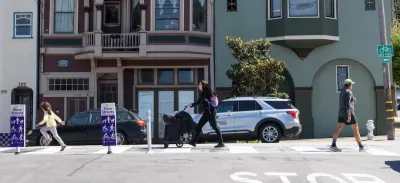Low-cost interventions aimed at slowing traffic are making a major impact on road safety.

San Francisco’s Slow Streets program is dramatically reducing injury collisions, reports Dan Brekke for KQED.
The program, which covers 32 miles and was made permanent in late 2022, is designed to limit traffic and reduce speeds to 15 miles per hour or lower on participating streets. Those segments saw a 61 percent drop in injury crashes, while the rest of the city saw a rise of 6 percent since December 2022.
“Christopher White, executive director of the San Francisco Bicycle Coalition, said in a statement that Slow Streets is a key component to building a citywide network accessible to people of all ages and abilities.” Advocates are calling on the city to speed the expansion of the program to achieve its Vision Zero goals, noting that the success of Slow Streets indicates how small changes can have a major impact.
Slow Streets interventions include low-cost tools such as flexible posts, paint, and signs. “It’s such an insignificant cost in terms of materials and labor, but yet it has had such a significant impact on public safety,” said data analyst Stephen Braitsch. Traffic safety advocates suggest adding other interventions such as signal timing and reducing the number of lanes on dangerous streets.
FULL STORY: SF Is Struggling to Reduce Traffic Deaths. Slow Streets Could Be an Answer

Maui's Vacation Rental Debate Turns Ugly
Verbal attacks, misinformation campaigns and fistfights plague a high-stakes debate to convert thousands of vacation rentals into long-term housing.

Planetizen Federal Action Tracker
A weekly monitor of how Trump’s orders and actions are impacting planners and planning in America.

In Urban Planning, AI Prompting Could be the New Design Thinking
Creativity has long been key to great urban design. What if we see AI as our new creative partner?

How Trump's HUD Budget Proposal Would Harm Homelessness Response
Experts say the change to the HUD budget would make it more difficult to identify people who are homeless and connect them with services, and to prevent homelessness.

The Vast Potential of the Right-of-Way
One writer argues that the space between two building faces is the most important element of the built environment.

Florida Seniors Face Rising Homelessness Risk
High housing costs are pushing more seniors, many of them on a fixed income, into homelessness.
Urban Design for Planners 1: Software Tools
This six-course series explores essential urban design concepts using open source software and equips planners with the tools they need to participate fully in the urban design process.
Planning for Universal Design
Learn the tools for implementing Universal Design in planning regulations.
Gallatin County Department of Planning & Community Development
Heyer Gruel & Associates PA
JM Goldson LLC
Mpact (founded as Rail~Volution)
City of Camden Redevelopment Agency
City of Astoria
Jefferson Parish Government
Camden Redevelopment Agency
City of Claremont





























